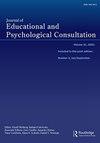Exploring Systems-Level Family Engagement Practices Across Elementary and PK-8 Schools
IF 1.1
4区 心理学
Q4 PSYCHOLOGY, EDUCATIONAL
Journal of Educational and Psychological Consultation
Pub Date : 2023-10-16
DOI:10.1080/10474412.2023.2269389
引用次数: 0
Abstract
ABSTRACTThe National Association of School Psychology recognizes the role that family engagement holds on school functioning and student outcomes. This article describes a qualitative study using constructivist grounded theory to explore systems-level family engagement practices in urban schools that implemented a Comprehensive Behavioral Health Model (CBHM). CBHM uses a data-driven Multi-Tiered System of Supports (MTSS) to provide behavioral and mental health services. Individual semi-structured interviews were conducted with six school psychologists representing seven CBHM-affiliated schools to explore perceptions of school-wide family engagement practices. Qualitative findings included five categories: commitment, communication, fostering a school community, feeling disconnected, and underdeveloped school systems. Findings revealed that families were engaged in various aspects of CBHM, and school psychologists promoted family engagement in multiple ways. However, efforts were at times unconnected to CBHM implementation, necessitating greater dialogue with families to integrate CBHM into wider systems. Implications for systems-level family engagement practices are also described.KEYWORDS: Multi-Tiered System of Supports (MTSS)Comprehensive Behavioral Health Model (CBHM)family engagementSchool-Wide Positive Behavioral Interventions and Supports (SW-PBIS)social-emotional learning (SEL) Disclosure statementNo potential conflict of interest was reported by the author(s).Additional informationNotes on contributorsLauren BrodskyDr. Lauren Brodsky, Ph.D., is a School Psychologist in Pinellas County Public Schools. She conducts comprehensive psychological evaluations, supports facilitation of Tier 3 academic interventions as a part of multi-tiered systems of support, provides behavioral and mental health counseling and crisis de-escalation, and frequently communicates with students' families. To contact Lauren Brodsky, please send an email to Brodskyl@pcsb.org.Anastasiia IunDr. Anastasiia Iun, Ph.D., completed her doctoral training in School Psychology at the University of Massachusetts Boston.Her research interests include development of social-emotional learning, academic, and prosocial skills, cross-cultural adjustment, and mental health. She is also interested in conducting interdisciplinary research in fields of applied behavior analysis, school psychology, and general psychology.Alexis ErvinAlexis Ervin, is a Ph.D. candidate and research fellow at the University of Massachusetts Boston. She has interned at urban schools in Boston, MA.Amy L. CookDr. Amy L. Cook, Ph.D., LMHC (she/her) is an associate professor and chair of the Department of Counseling and School Psychology at the University of Massachusetts Boston. She received a Ph.D. in Educational Psychology, with a concentration in Counseling Psychology, from the University of Connecticut Storrs. She is a former counselor in urban schools and mental health organizations. Her research focuses on developing culturally responsive practices that promote youth development and equity-oriented outcomes largely via community-engaged participatory research with youth and educators in partner schools and organizations.Melissa PearrowDr. Melissa Pearrow, Ph.D., is a Professor of School Psychology at the University of Massachusetts Boston, where she teaches graduate courses in legal, ethical, and professional practices of school psychologists. She previously served as the chair of the Ethics Board of the National Association of School Psychologists. She is also the Executive Director of the BIRCh (Behavioral health Integrated Resources for Children) Project which represents a collaboration between the University of Massachusetts Boston and Amherst to provide professional resources to strengthen the coordination of behavioral health supports provided by school and community agencies.探索系统层面的家庭参与实践在小学和PK-8学校
国家学校心理学协会认识到家庭参与对学校功能和学生成绩的影响。本文描述了一项使用建构主义理论的定性研究,以探索实施综合行为健康模型(CBHM)的城市学校系统级家庭参与实践。CBHM使用数据驱动的多层支持系统(MTSS)来提供行为和心理健康服务。对代表七所cbhm附属学校的六名学校心理学家进行了个人半结构化访谈,以探讨全校范围内家庭参与实践的看法。定性调查结果包括五个类别:承诺、沟通、培养学校社区、疏离感和不发达的学校系统。研究结果显示,家庭参与了家庭行为管理的各个方面,学校心理学家通过多种方式促进家庭参与。然而,这些努力有时与儿童健康管理的实施无关,因此需要与家庭进行更多的对话,将儿童健康管理纳入更广泛的系统。还描述了对系统级家庭参与实践的影响。关键词:多层支持系统(MTSS)综合行为健康模型(CBHM)家庭参与全校积极行为干预与支持(SW-PBIS)社会情绪学习(SEL)披露声明作者未报告潜在利益冲突作者简介:lauren brodsky博士劳伦·布罗茨基博士是皮内拉斯县公立学校的一名学校心理学家。她进行全面的心理评估,支持促进三级学术干预作为多层支持系统的一部分,提供行为和心理健康咨询以及危机降级,并经常与学生家庭沟通。要联系Lauren Brodsky,请发送电子邮件至Brodskyl@pcsb.org.Anastasiia IunDr。Anastasiia Iun博士在马萨诸塞大学波士顿分校完成了她的学校心理学博士培训。她的研究兴趣包括社会情感学习的发展、学术和亲社会技能、跨文化适应和心理健康。她还对应用行为分析、学校心理学和普通心理学领域的跨学科研究感兴趣。Alexis Ervin是马萨诸塞大学波士顿分校的博士候选人和研究员。她曾在马萨诸塞州波士顿的城市学校实习。艾米·库克博士。Amy L. Cook,博士,LMHC(她/她)是马萨诸塞大学波士顿分校咨询和学校心理学系的副教授和系主任。她获得康涅狄格大学斯托尔斯分校教育心理学博士学位,主修咨询心理学。她曾在城市学校和心理健康组织担任顾问。她的研究重点是发展文化响应的做法,促进青年发展和公平导向的成果,主要是通过社区参与研究与青年和教育工作者在合作学校和组织。梅丽莎PearrowDr。Melissa Pearrow博士是马萨诸塞大学波士顿分校的一名学校心理学教授,她在那里教授研究生课程,包括法律、伦理和学校心理学家的专业实践。她曾担任全国学校心理学家协会伦理委员会主席。她也是BIRCh(儿童行为健康综合资源)项目的执行主任,该项目代表了马萨诸塞大学波士顿分校和阿默斯特大学之间的合作,提供专业资源以加强学校和社区机构提供的行为健康支持的协调。
本文章由计算机程序翻译,如有差异,请以英文原文为准。
求助全文
约1分钟内获得全文
求助全文
来源期刊

Journal of Educational and Psychological Consultation
PSYCHOLOGY, EDUCATIONAL-
CiteScore
3.40
自引率
23.50%
发文量
20
期刊介绍:
The Journal of Educational & Psychological Consultation (JEPC) provides a forum for improving the scientific understanding of consultation and for describing practical strategies to increase the effectiveness and efficiency of consultation services. Consultation is broadly defined as a process that facilitates problem solving for individuals, groups, and organizations. JEPC publishes articles and special thematic issues that describe formal research, evaluate practice, examine the program implementation process, review relevant literature, investigate systems change, discuss salient issues, and carefully document the translation of theory into practice.
 求助内容:
求助内容: 应助结果提醒方式:
应助结果提醒方式:


